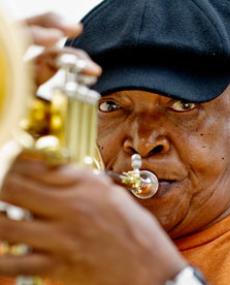
Hugh Ramopolo Masekela was born on 4 April 1939 in Witbank, near Johannesburg. Masekela showed musical ability from a young age, and began to play piano as a child. Inspired by the movie Young Man with a Horn, Masekela began to play the trumpet, encouraged by anti-apartheid activist Father Trevor Huddleston, who helped him acquire the instrument.
At Huddleston’s request, Masekela then received tuition in trumpet playing from Uncle Sauda, who played for the Johannesburg ‘Native’ Municipal Brass Band. Masekela soon mastered the trumpet, and began to play with other aspiring musicians in the Huddleston Jazz Band – South Africa’s first youth orchestra.
In his early days as a teenager on the South African music scene, Masekela played with artists such as Dollar Brand (Abdullah Ibrahim), Jonas Gwangwa and Kippie Moeketsi. Masekela also collaborated with famous icons like Miriam Makeba, Zimbabwean Dorothy Masuka, Fela Anikulapo Kuti, Hedzoleh Soundz, Francis Fuster and Dudu Pukwana.
Masekela also formed an integral part of the orchestra for the South African Broadway-style musical King Kong, which was written by Todd Matshikiza. This took place after Masekela toured with the jazz band the Manhattan Brothers in 1958, and was even featured on London’s West End for two years. This successful musical featured many of the above-mentioned artists.
Masekela was deeply affected by his life experiences, and therefore made music that reflected his experiences in the harsh political climate of South Africa during the 1950s and 1960s. Masekela’s music therefore portrays the struggles and joys of living in South Africa, and voiced protest against slavery and discrimination.
After the Sharpeville Massacre, Masekela was assisted by Huddleston and other international friends to study in America. Therefore, in 1961, Masekela went into exile. Masekela went to study at the London Guildhall School of Music, and later the Manhattan School of Music, where he befriended Harry Belafonte.
Masekela went on to compose and record many new songs in New York; including his 1968 number one hit ‘Grazing in the Grass’. Masekela played primarily in jazz ensembles, like the Jazz Epistles, and successfully collaborated with international artists like The Byrds and Paul Simon.
In the 1980s, Masekela set up a mobile studio in Botswana, where he further developed his musical style using African mbaqanga strains. Masekela performed with Paul Simon on the Graceland tour, along with Ladysmith Black Mambazo. Masekela defended Simon vigorously when the tour was seen as a violation of the African National Congress' cultural boycott. His 1987 hit ‘Bring Him Back Home’ became the anthem for Nelson Mandela's world tour, following his release from prison in 1992.
Masekela had also produced music for the musicals like Sarafina, and was featured in the 2003 documentary film Amandla! Masekela’s musical style continues to incorporate various African styles fused with jazz and funk, and has evolved into more of an adult contemporary style, which can be heard on his albums Techno-Bush, Tomorrow, Uptownship and Revival.
Masekela continued to produce music and tour extensively throughout the world, which recently included a 2007 tour to the USA and Canada to promote the live recording, "Hugh Masekela: Live at the Market Theatre". A Grammy award winner for “Best Contemporary Pop Performance-Instrumental” as far back as 1968, Masekela is still honoured today as one of South Africa’s most prominent and talented musicians.
He passed away on 23 January 2018 after a battle with prostate cancer.